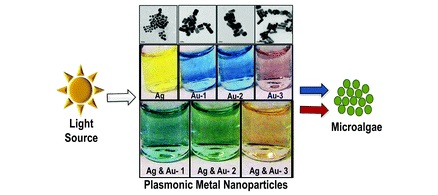Golden house to feed algae their favourite waves

The novel system surrounds growing microalgae with a nano-particle light filter, which adjusts the incoming light to the perfect wavelength for stimulating algae growth.
The technique is the result of a collaborative project between Flinders University and the University of Western Australia, and with further development will have direct improvements for many fields – most notably the large-scale production of biofuels to end the reliance on non-renewable sources.
Algae loves light, and it is essential for its growth. However, too much light, or certain wavelengths of light, can damage the organism and inhibit growth.
To prepare a delicious feast at its favourite wavelength, the scientists took algae growing in flasks and surrounded it with a solution of gold and silver nanoparticles.
The size and composition of the particles were tweaked to harness light wavelengths microalgae like most, for growth and formation of photopigments such as chlorophyll.
Professor Colin Raston, an author of the study now published in the journal Green Chemistry, said: “it’s not as simple as increasing light intensity because the algae will bleach and get toxic stress through the accumulation of oxygen.”
“But by putting light in the nanoparticles at a wavelength the algae can handle it matches the light the algae are using in the flask, and the algae then absorbs that light which stimulates growth,” he said.
“The system uses nanoparticles placed in a separate flask on the outside of the algae flask which means the nanoparticles are not in direct contact with the algae, therefore avoiding any toxicological issues and contamination.”
Microalgae has dozens of applications that are set to be improved by the new method, including the production of biofuels, medical antioxidants and anti-inflammatory agents, natural food and soap colourants, cosmetic agents and feed supplements in aquaculture.
“The speed and efficiency at which microalgae grow is currently limiting them from being turned into commercially viable products so it’s hoped that if we can increase the yield of algae we can produce valuable algae-to-energy products at a much faster rate,” Prof Raston said
“It’s a significant advancement in developing technologies to optimise the growth of algae for renewable fuels, specialty chemicals and value-added chemical compounds for applications in the pharmaceutical industry.”
Full details are available from the official report, now accessible online.








 Print
Print